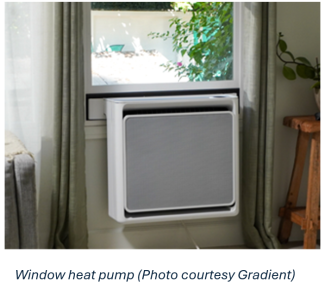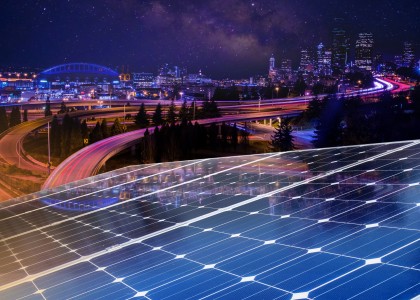Large multifamily buildings with central heating systems that burn fossil fuels are among the hardest to decarbonize, but window-mounted heat pumps now provide a lower-cost option than any previous technology, a new study finds. The report from the American Council for an Energy-Efficient Economy (ACEEE) recommends that, in most cases, building owners seeking to decarbonize should consider these heat pumps along with mini-split and central air-to-water heat pumps, with the best choice often based on building-specific characteristics.
Read the Report The study analyzed upfront costs and operating costs over 24 years, finding that window heat pumps are the least expensive decarbonization option, costing an average of about $14,500 per apartment for purchase and operation. Central air-to-water heat pumps cost an average of just under $22,000 per apartment, and mini-split heat pumps come in at just over $25,000.
A new type of window heat pump has emerged in recent years that straddles a windowsill to avoid blocking light and can plug into a standard 120-volt outlet. Cold-climate models provide heat at outdoor temperatures as low as zero degrees Fahrenheit without backup heating. The new window heat pumps are available with variable-speed compressors that provide consistent temperatures and reduce on/off cycling. The New York City Housing Authority has installed the new window heat pumps in its properties for more than a year, and initial deployments are now beginning in other cities. Central air-to-water heat pumps are also new to the U.S. market, with several initial installations in New York City and the Boston area.
ACEEE’s report also analyzed three options to burn biofuels for residential heating—biomethane boilers, bio-oil boilers, and central air-to-water heat pumps with a biofuel backup—and found their costs averaged from about $21,000 to about $23,000. However, such systems cannot fully decarbonize building heat because biofuels have substantial carbon emissions. Additionally, supplies of these fuels are scarce, limiting their practicality as a widespread solution. The research found no applications of boilers fully fired with biofuels.
“Heat pumps—especially cutting-edge technologies like window-mounted models—offer the most cost-effective and scalable way to fully decarbonize heating in apartment buildings,” said Steven Nadel, executive director of ACEEE and the study’s lead author. “Biofuels may play a limited role, but they simply can’t deliver the deep emissions cuts we need at scale.”
Much of the attention on electrifying residential space has been on single-family homes and residences where each house or apartment is served by its own heating system. But about 23 million U.S. homes are in existing multifamily buildings with five or more units. ACEEE’s new report focused on the 36% of those apartments that are served by central heating.
To complement decarbonization of large apartment buildings, the report calls on policymakers and regulators to expand support for energy efficiency measures like improving insulation and other building envelope upgrades. The report also recommends accompanying policies such as electric rates that encourage heat pumps based on the cost of service, offering additional financial incentives for electrification and efficiency measures, and putting a price on carbon emissions to reflect the damage from fossil fuel combustion and help pay for heat pump incentives.
ACEEE’s analysis is based on modeling of a representative dataset of 533 apartments throughout the United States in buildings with five or more units. The dataset is from the U.S. Energy Information Administration’s Residential Energy Consumption Survey (RECS), which collects data at the apartment level. The analysis of different low-carbon heating options was based on space-heating data for each apartment in the RECS dataset, using apartment-specific energy use and costs.



